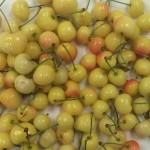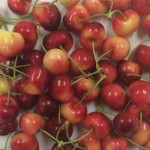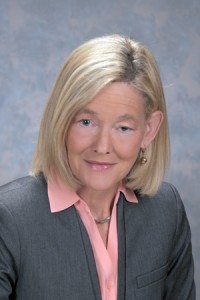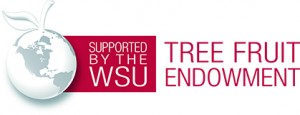By Dr. Elizabeth Beers, Dr. Andrea Bixby Brosi, WSU Tree Fruit Research and Extension Center.
Diagnosing Little Cherry Disease
Don’t mistake little cherry disease with small cherries. Winter damage, cold damage, inadequate tree nutrition and other factors can cause small cherries. Generally, when abiotic factors cause small cherries the plants will have additional symptoms such as small leaf size or gumming.


Little Cherry Disease is unique in that the symptoms are limited to the fruit and nothing else. The rest of the tree looks fine. A diseased tree will appear normal until about 2-3 weeks before harvest, when disease symptoms become evident in the fruit. Pickers will reject the small, poorly colored fruit, leaving unpicked limbs and whole trees. Diseased fruit tastes bitter due to low sugar content.
Unfortunately, visual symptoms can be confusing. Before you make the decision to tear out a block of trees it is recommended that you take a sample and send it out for molecular (PCR) testing.
A revised version of a diagnostic kit detecting only LChV2 was made commercially available in the fall of 2015 by Agdia, Inc. The kits were modified to more accurately detect a unique genetic variant of LChV2, which the original test missed. It is important to use these test kits in a clean area (not the truck tailgate as originally envisioned).
Sampling for Little Cherry Disease
Trees showing signs of Little Cherry Disease should be flagged when symptoms become evident. The best time to see obvious Little Cherry Disease symptoms is a few days prior to harvest, although they may appear several weeks before harvest. Flag limbs that are most symptomatic.
Sampling symptomatic trees during the harvest season requires a total of 10 leaves per tree as the minimum sample size. Samples should be taken from symptomatic limbs to ensure a sufficient virus concentration for detection. if the trees in question are non-symptomatic, collect a representative 10-leaf sample containing at least two leaves from each leader (more if less than 5 leaders). Place leaves in a Ziplock bag and label with orchard information. Keep the leaf samples on ice or refrigerated until testing can be completed. Dry brittle leaves are not acceptable, regardless of age. If you plan to send multiple samples, make sure to clearly label bags to distinguish the sample contents. Remember healthy clusters on positive trees can have negative results, so send samples of the most symptomatic material. Dormant season sampling (January or February) requires 8 inches of dormant bud wood collected from each of the tree’s leaders (minimum of 5 bud wood samples per tree).
Mailing Samples for Diagnosis
If you are uncertain if the symptoms are in fact Little Cherry Disease, you can send a sample of plant material to WSU’s Clean Plant Center in Prosser. The link below will list all the diseases they can test for (see the Prunus section for Little Cherry). There is a link on the page to the Testing Agreement form that must be filled out, and the address to send the form and samples(s).
http://cpcnw.wsu.edu/virus_lab/fruit-tree-testing-therapy/
Send samples to:
Clean Plant Center Northwest/Hamilton Hall
Attn.: Tina Vasile
Prosser Irrigated Agriculture Research and Extension Center
24106 N Bunn Rd. Prosser WA 99350
The contact for the lab is Tina Vasile (509) 786-9382 http://cpcnw.wsu.edu/virus_lab/elisa_lab/. Drop the samples off at Prosser or send them overnight mail in a Styrofoam shipping container with an icepack. Be sure to include your name and contact information with the package. Avoid sending samples on Thursday or Friday.
Check with the lab for details on current fees.
For more information visit the Little Cherry Page.
Contact
Elizabeth Beers
Professor & Entomologist
Department of Entomology, Washington State University
Tree Fruit Research & Extension Center Wenatchee, WA 98801
Phone: 509.663.8181 x234
Fax: 509.662.8714
email: ebeers@wsu.edu

